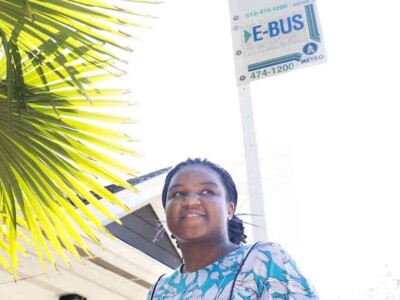In October 2018 at 8:30 p.m. after a long day of meetings and classes, senior social work major Danielle Redhead waits 90 minutes in rainy cold weather for a shuttle bus to arrive.
She arrived at the bus stop in front of the Recreational Sports Center on San Jacinto boulevard expecting her usual quick ride home. But The University of Texas at Austin shuttles running the Capital Metro route 670 were delayed once again. Redhead had endured shuttle delays for the past two years while living in University Estates, an apartment complex located at 1300 Crossing Place. Like University Estates, several student housing complexes in Riverside are in an area where Redhead says many low-income students and students of color reside. Frustrated with the city’s public transportation system, Redhead decided it was time to advocate for change.
Shuttle delays for route 670 worsened in June 2018 after an initiative by Capital Metro, Austin’s public transportation provider, rearranged and eliminated routes. The initiative, called Cap Remap, impacted UT students and riders across Austin. Before Cap Remap, the average wait time for students traveling on route 670 was about 25 to 30 minutes.
After the implementation of Remap, shuttles traveling the route arrived less frequently, which led to overcrowding. Redhead said boarding the shuttle was sometimes “overwhelming and panic-inducing” because students would push and shove to secure their spot on the bus. Students described how they were “fighting for a spot in the bus, like ‘The Hunger Games.’”
“In the morning, I’d wake up like an hour to two hours earlier just to make sure I got a seat on the bus because it would be so packed and people would be standing shoulder to shoulder,” Redhead said.
In addition to overcrowding, shuttle delays caused students to arrive late to class. As the social work representative in UT Student Government, Redhead decided to develop a plan. She and other Riverside residents attended a Cap Metro board meeting on October 22, 2018, to advocate for more shuttles to run on route 670 during peak times. Taking notice of Redhead’s presence at the board meeting, Cap Metro and University Transportation and Parking Services met exclusively with Redhead and other student residents living in Riverside. Still nothing changed.
After weeks of no improvement to shuttle delays, Redhead wrote an op-ed for the Daily Texan to publicly express her concerns. Soon after it published, Cap Metro and PTS contacted Redhead to discuss issues regarding route 670. After meeting with Cap Metro and PTS, shuttles were added to route 670 on Nov. 26, 2018, until the end of the semester. Redhead said although she initially thought no one would listen to her concerns about shuttle delays, she’s happy she did her part.
“It was a huge issue that was being overlooked,” Redhead said. “That’s what social work is, calling attention to these communities that are marginalized and overlooked.”
Shuttles on route 670 changed back to the original route on Jan. 19, 2019. Parking and Transportation Services sent an email stating “Cap Metro will continue to monitor Route 670 in an effort to improve efficiencies.” Redhead said she is happy route 670 changed, but she plans to meet with Cap Metro and PTS again this spring to ensure the shuttle schedule meets student needs.
“I believe it’s important to keep fighting for this issue because the issue regarding the UT Riverside shuttles is not just a transportation problem, it’s an education issue,” Readhead said. “In social work, we are often taught the importance of advocacy. I am so grateful that I could use my position and platform in Student Government to amplify the voices of and advocate for other Riverside students.”
By Montinique Monroe. Posted January 28, 2019.


